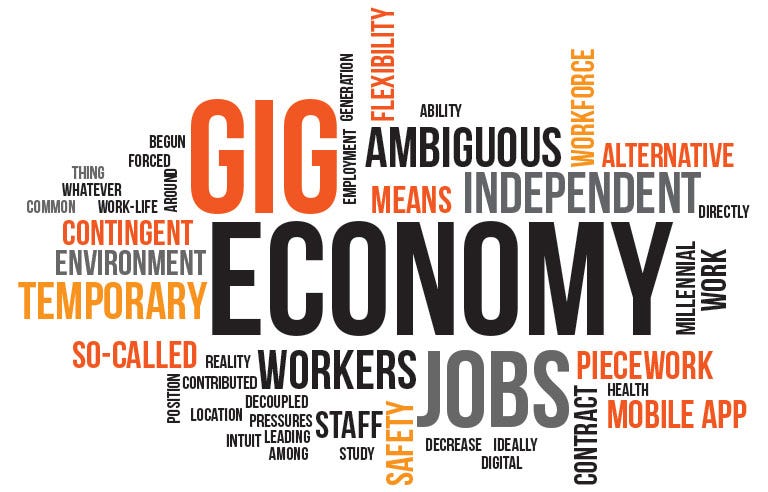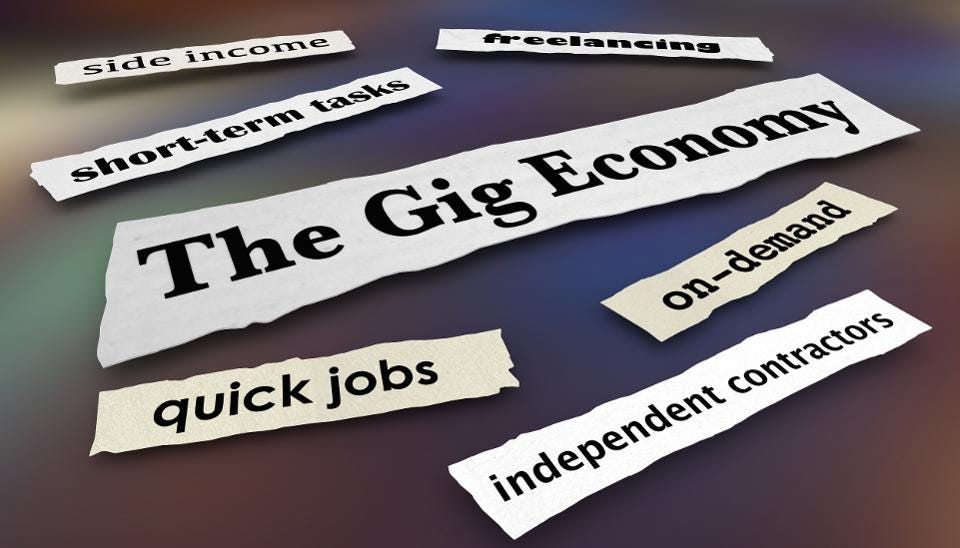South Africa’s Gig Economy Is Falling Behind—And the Consequences Go Far Beyond Employment
Africa’s digital economy is at a critical crossroads. While countries like Nigeria and Kenya are sprinting ahead, building agile online labor ecosystems and exporting talent across borders, South Africa—long seen as the continent’s most industrially advanced nation—is lagging behind in the very economy meant to define Africa’s future.
The gig economy, driven by freelancers, remote workers, creators, and platform-based labor, is no longer just an alternative—it’s a cornerstone of global economic participation. But in South Africa, its growth has been hesitant, fragmented, and deeply unequal. This is not just a matter of internet speeds or digital platforms. It’s about how structural inequality, outdated mindsets, and stalled policy are holding back a generation that should be leading Africa’s digital evolution.
The Digital Labor Crisis: A Missed Opportunity for Economic Mobility
The online gig economy is built on accessibility. Its promise lies in the idea that anyone, from anywhere, can offer skills—writing, coding, design, editing, virtual assistance—to a global marketplace and get paid for their talent. But in South Africa, this promise has not reached its full potential.
While global freelance markets have ballooned to over half a trillion dollars, South Africa contributes just 0.17% to that number—trailing behind Kenya (0.37%) and Nigeria (0.27%). In a country where youth unemployment is nearing 60%, that’s not just a statistic—it’s a crisis of direction.
It’s not that South Africans don’t want to freelance. It’s that the system hasn’t made it viable for enough of them to try.
The Infrastructure Myth: When Access Exists, but Inclusion Doesn’t
On paper, South Africa has the infrastructure needed for a thriving gig economy: stable electricity in urban centers, functional banking systems, a high smartphone penetration rate, and a large English-speaking population. But this infrastructure is deceptive—it masks deep divides.
For urban professionals, the option to freelance exists—but is still seen as a downgrade from full-time employment. For township youth and rural communities, internet access remains prohibitively expensive. Many rely on mobile data plans that make consistent gig work unrealistic. And even when data is available, digital literacy is not guaranteed.
In short: the infrastructure is there, but it’s inaccessible to those who need it most. The result? A two-tiered digital economy where privilege, not potential, determines participation.
The Mindset Gap: Why South Africa Isn’t Hustling Like the Rest
Across Nigeria and Kenya, the gig economy is seen as liberation—a path away from unemployment, gatekeeping, and low-paying local jobs. Young people are building careers off Fiverr, Upwork, Toptal, and even TikTok. They are exporting skills and importing dollars.
In South Africa, however, freelancing is still often viewed as a fallback—not a first choice. A deeply ingrained corporate culture, paired with outdated schooling systems that still champion formal employment, has created a generation that equates job security with success. But in a global economy shaped by automation, AI, and remote work, that equation no longer holds.
And so the digital revolution passes many South African youth by—not because they aren’t talented, but because the system hasn’t prepared them to believe that freelancing is a legitimate future.
The Participation Crisis: Who Gets to Work in the Gig Economy?
South Africa’s freelance economy is disproportionately dominated by software developers, designers, and tech professionals. According to JobLeads, software development accounts for over 44% of gig work in the country. That’s not a bad thing—but it’s also not enough.
The real strength of a digital economy lies in its diversity. In Kenya, gig platforms are filled with transcribers, data entry workers, online tutors, voice-over artists, virtual assistants, and digital marketers. In Nigeria, influencer marketing, copywriting, online teaching, and digital artistry are fueling an entire ecosystem.
South Africa hasn’t yet unlocked these low-barrier-to-entry roles. And without that diversity, its gig economy becomes an elite marketplace—accessible only to those with expensive laptops, formal training, and time to spare.
The Education Gap: Schools Teaching Yesterday’s Jobs
The slow adoption of gig work in South Africa is not just a tech issue—it’s an educational one. Many schools and universities continue to prepare students for traditional employment, with little exposure to global platforms or entrepreneurial thinking.
Coding bootcamps, freelancing workshops, and creator economy programs are still niche in South Africa, while they’ve become mainstream in places like Lagos and Nairobi. Without early exposure to gig platforms or guidance on how to package and sell digital skills, young people are left with degrees—but no pathway to digital independence.
This is a failure of imagination. South African youth aren’t lacking talent—they’re lacking infrastructure, exposure, and belief.
The Digital Economy Divide: Social Media as a Double-Edged Sword
Social media is often hailed as the great equalizer—but in South Africa, it has reinforced a new kind of digital class divide. Platforms like Instagram, TikTok, and Twitter are flooded with South African creatives—but monetization remains elusive.
In Nigeria, influencers are landing brand deals. In Kenya, TikTok educators are building audiences and turning them into income. In South Africa, algorithm changes, content gatekeeping, and limited platform support mean that many creators go viral—but don’t get paid.
It’s a familiar story: South African culture, music, slang, and aesthetics travel globally, but the creators behind them remain underpaid and under-platformed.
The Policy Crisis: No Plan for the Gig Generation
While Kenya has launched national initiatives to support online freelancers and Nigeria is home to a fast-growing number of government-backed tech hubs, South Africa has yet to articulate a clear policy vision for its gig workers.
There are no government grants tailored to digital freelancers. No tax incentives. No national skills accelerator for gig work. Even the country's unemployment strategy still centers on formal job creation—despite all signs pointing to remote work, micro-entrepreneurship, and platform labor as the future.
This policy vacuum sends a clear message: digital workers are not yet recognized as economic drivers. And until that changes, the gig economy will remain underdeveloped.
What South Africa Risks Losing
The cost of a stalled gig economy isn’t just lost income. It’s lost momentum. Lost innovation. Lost talent. Without a thriving freelance sector, South Africa risks:
Widening youth unemployment
Missing out on foreign exchange from global clients
Falling behind in creative and tech exports
Watching its neighbors build the platforms it could have led
Africa’s future is digital—but it is also decentralized. Talent will no longer wait for permission. If South Africa doesn’t move fast, its creative class will either migrate—or stagnate.
Reclaiming the Narrative: A Path Forward for South Africa
If South Africa is serious about reclaiming its role as a leader in Africa’s digital transformation, it must act now. Not with surface-level reforms, but with a systemic rethinking of what work looks like in the 21st century.
Build the Infrastructure for Inclusive Access: Affordable broadband, community internet hubs, and platform training in townships and rural areas must be treated as national priorities—not luxuries.
Mainstream Gig Work in Education: Freelancing should be embedded in school curricula, not just in elite universities or coding bootcamps. Let students graduate with portfolios, not just certificates.
Incentivize Gig Platforms to Localize: South Africa can partner with global freelancing platforms to reduce fees, localize onboarding, and integrate mobile payments to make entry easier for new workers.
Support Creators and Freelancers Through Policy: From tax relief for micro-entrepreneurs to grants for digital creatives, the state must stop waiting for formal jobs to appear—and start investing in informal potential.
Conclusion: The Gig Economy Is Not a Side Hustle—It’s the Main Event
South Africa’s economic future will not be decided in boardrooms or mines. It will be built on fiber-optic cables, mobile phones, and the creativity of a generation that refuses to be left behind. But only if the country chooses to act.
Because the gig economy isn’t a trend—it’s a tectonic shift. And in this new world, delay is decline.
The question isn’t whether South Africans are ready. It’s whether the system is ready for them.
A guest post by
A curious mind exploring the crossroads of creativity and insight.





